On Vietnamese cyberspace, there has been a lot of information calling for charity from scammers impersonating people to make a profit.
 |
| Warning about charity and donation scams to support flood victims. (Source: Ministry of Information and Communications ) |
Last week, in addition to the four methods commonly used by criminals to deceive Vietnamese people, the Department of Information Security (Ministry of Information and Communications) also warned domestic users about two new online scams that have appeared in the world .
Recently, in addition to policy, legal and technical solutions, the Information Security Department has also paid special attention to propaganda solutions to raise awareness and anti-fraud skills for users.
Specifically, in August, the Department of Information Security discovered 55 more websites impersonating brands to commit fraud, bringing the total number of fake and fraudulent website addresses in the anti-fraud database to 125,226. Along with that, "Weekly News" is one of the propaganda activities that the Department of Information Security has maintained continuously since November last year, with the aim of helping users recognize and have the skills to respond to online fraud situations. Below are 6 outstanding information about the online fraud situation in the week from September 9 to September 15:
Charity scams after Typhoon Yagi
Taking advantage of the impact of Typhoon Yagi and the heavy rains, flash floods, and post-storm inundation, Vietnam's cyberspace has seen many charity appeals from impersonators for profit. The subjects impersonated government agencies, the Red Cross and other reputable charities to call for donations in order to appropriate people's money to support people affected by natural disasters.
The scammers also used many images and information similar to official pages to call for donations, causing many people to be confused and transfer money to them.
The Information Security Department recommends that before donating, people should carefully research the organization calling for donations and verify the authenticity of the information. When wanting to share the difficulties with people in areas affected by natural disasters, people should donate and support through reputable and transparent agencies and units to ensure that their contributions are truly meaningful.
Impersonating doctors and cosmetic hospitals to defraud and appropriate property
Taking advantage of the increasing demand for beauty among people, recently, scammers have continuously impersonated hospitals and cosmetic doctors to gain trust from customers for illegal profits. Specifically, scammers create fake social media accounts with the names and images of reputable doctors. These pages often share articles related to health and medical examination and treatment to attract attention and gain trust from followers.
In addition, the subject also provides images of fake certificates and degrees or edits images to fake the doctor's identity to increase the level of credibility. After building trust, the scammer offers online medical examination and treatment services with low prices, special offers and appropriates the patient's deposit.
Recommending people to be cautious when choosing medical examination and treatment services and selling medicine online, the Information Security Department advises them to carefully check information about doctors and medical facilities before using the service; they should only use legitimate online medical examination and treatment platforms that are licensed and have a clear doctor identity verification system.
Lost billions when investing financially on social networks
Financial investment scams on social networks have recently caused many people to lose large sums of money. For example, a woman living in Hanoi recently reported to the police that she was scammed out of 2.3 billion VND after joining the group 'Tien chinh thoi dai' and investing in virtual currency through the Bitforex.com exchange.
In terms of tricks, scammers often set up fake stock exchanges, invest in virtual currencies and pretend to be financial experts, stock specialists or representatives of reputable brokerage companies. Next, they invite victims to investment groups on Facebook, Telegram, Zalo... and invite them to join the exchange they created.
Initially, the advertiser promises that the exchange has high interest rates, even providing fake evidence of profits from previous investors. However, after attracting a large number of investors and receiving money, the virtual exchange will close down or disappear, causing investors to lose all their invested money.
The Information Security Department recommends that people do not invest or trade on virtual currency exchanges, digital currency, websites or virtual currency investment applications; do not share personal information with anyone; and do not download applications of unknown origin or click on strange links.
Beware of fraudulent labor export tricks
The Overseas Labor Center (Ministry of Labor, Invalids and Social Affairs) has just warned about fake information and fraud about workers going to Korea to work under the EPS program.
According to the Department of Information Security, the method of labor export fraudsters is to impersonate legal labor brokerage companies by creating websites and providing fake documents.
The subjects also organized seminars in localities, promising jobs abroad with high incomes and good working conditions. Then, they asked the workers to pay large sums of money to complete the procedures and appropriated that money.
Recommending workers to carefully learn about labor export programs through official sources, the Information Security Department also reminded them not to believe in advertisements or invitations that promise attractive jobs but lack legal basis. Workers also need to check and verify the labor brokerage unit; do not pay any money before signing a labor contract.
 |
| Beware of scams via Google voice. (Source: Ministry of Information and Communications) |
New online scam targets Google Voice users
A new scam targeting buyers and sellers through social media platforms using Google Voice has been reported in the US. Initially, the scammers pretend to be interested and contact accounts posting on Craigslist and Facebook Marketplace about the need to buy and sell products and services.
After chatting, the subject will proactively send a verification code for his Google Voice account and ask the victim to provide a phone number, and verify the authenticity by sending the code back. Next, the subject will use the code shared by the victim to create another Google Voice account linked to the victim's phone number.
This will allow the scammer to take control of the victim’s phone number via Google Voice account, thereby monitoring all the content of the phone’s messages, calls and making illegal money transfers. The damage caused by this trick can range from a few hundred to thousands of dollars.
The Information Security Department recommends that people be vigilant when using Google Voice; do not follow instructions from strangers, do not provide personal information and data without verifying the identity of the subject; and improve security by enabling 2-layer security mode with applications.
When suspecting signs of fraud, users need to immediately report to the application management department to promptly prevent fraudulent behavior.
Create Deepfake video impersonating Apple CEO to scam investors
Recently, many Americans have come across livestreams with content calling for virtual currency investments that are said to come from Apple CEO Tim Cook, but in fact these are fake videos, created by scammers using Deepfake technology with the purpose of appropriating users' assets.
Specifically, in the Deepfake video impersonating the face and voice of Apple CEO Tim Cook, which is livestreamed on social media platforms, the fake Tim Cook will make comments about the stock market, thereby calling on viewers to participate in investing by sending money in the form of popular virtual currencies such as Bitcoin, Ether, Tether or Dogecoin. After receiving a certain amount of money from viewers, the subject will turn off the livestream, delete all related videos and information.
The Information Security Department recommends that people be wary of investment invitations that promise high profits and low risks; proactively verify the legality of cryptocurrency investment projects, and not trust or follow the instructions of these subjects.
People also need to verify the origin of videos or posts on social networks; announcements from celebrities and large corporations often only appear on official electronic information portals or accounts with blue ticks and many followers. In case of detecting signs of fraud, users need to report fake accounts to promptly prevent fraudulent behavior.
Source: https://baoquocte.vn/canh-giac-chieu-tro-lua-dao-tu-thien-quyen-gop-ung-ho-dong-bao-vung-lu-lut-286412.html


![[Photo] Hanoi morning of October 1: Prolonged flooding, people wade to work](https://vphoto.vietnam.vn/thumb/1200x675/vietnam/resource/IMAGE/2025/10/1/189be28938e3493fa26b2938efa2059e)
![[Photo] Keep your warehouse safe in all situations](https://vphoto.vietnam.vn/thumb/1200x675/vietnam/resource/IMAGE/2025/10/1/3eb4eceafe68497989865e7faa4e4d0e)
![[Photo] President of the Cuban National Assembly visits President Ho Chi Minh's Mausoleum](https://vphoto.vietnam.vn/thumb/1200x675/vietnam/resource/IMAGE/2025/10/1/39f1142310fc4dae9e3de4fcc9ac2ed0)















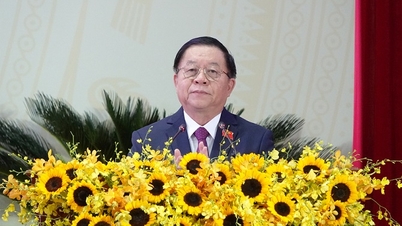



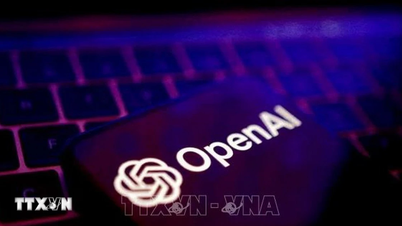










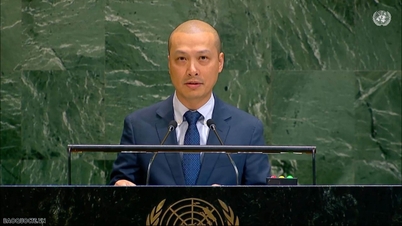
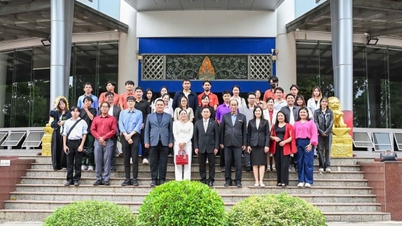

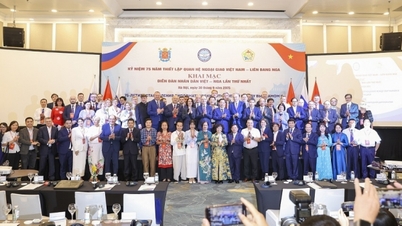



























































Comment (0)